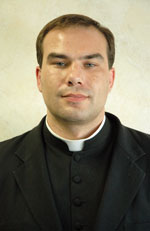Archdiocesan priest to study Orthodox theology at Vatican’s request
By Sean Gallagher
 After completing his third year of graduate studies in Rome, during which he worked toward earning doctoral degrees in liturgy and philosophy, Father Christian Kappes said he feels “almost like a professional student.”
After completing his third year of graduate studies in Rome, during which he worked toward earning doctoral degrees in liturgy and philosophy, Father Christian Kappes said he feels “almost like a professional student.”
Now, his “career” as a student will continue for possibly three more years in Greece.
In this new phase, his studies will continue at the request of the Vatican.
Father Kappes will participate in a pilot program set up by the Vatican and the government of Greece in which he and other Catholics will earn advanced degrees in Greek Orthodox theology in Greece.
He said the ultimate purpose of the program is that he and those who will participate in it later will possibly assist in “an official commission between the Vatican and the Greek Orthodox Church to try to overcome a lot of the dissensions that historically have divided us.”
Having grown up on the south side of Indianapolis as a member of Most Holy Name of Jesus Parish in Beech Grove, Father Kappes said he never could have predicted where he would be taken when he discerned a call to the priesthood approximately 10 years ago.
“I wouldn’t have guessed it,” Father Kappes said during a recent visit to Indianapolis. “I grew up being interested in sports and doing academics because that’s how you get [athletic] scholarships. But I wasn’t particularly interested in academics.”
Msgr. Joseph F. Schaedel, vicar general, has known Father Kappes since he was in grade school, and preached at his Mass of Thanksgiving after his ordination in 2002.
“I am delighted that he has the talents and abilities the Holy See is seeking to foster better understanding and relationship between the Roman Catholic Church and the Greek Orthodox Church,” Msgr. Schaedel said. “We should be proud. I sure am. The expertise and understanding of this relationship will always be invaluable to Father Kappes in his ministry in the coming years.”
Father Kappes said it was his experience of parish ministry at St. Louis Parish in Batesville from 2002-05 that led him to begin graduate studies.
“I realized that I was academically unequipped to deal with some of the problems that I [was faced with],” Father Kappes said. “I realized that I needed it because I needed to have a better ability to answer questions and apply theology to the practical life.”
He first learned about the possibility of participating in the program when Dominican Father Charles Morerod, the dean of the philosophy faculty at the Pontifical University of St. Thomas Aquinas in Rome—commonly known as the Angelicum—and the secretary of the Holy See’s International Theological Commission, told Father Kappes that he had nominated him.
Father Kappes said it is likely that his nomination is due to his academic interest in the appreciation of some Orthodox theologians in the Middle Ages for the philosophy of St. Thomas Aquinas and similar scholastic philosophers in the Catholic Church.
This took place two centuries after a definitive break in ties between the Catholic Church in Western Europe and the various Orthodox Churches in Eastern Europe and parts of the Middle East.
Father Kappes said that, through his studies, he hopes “to reintroduce Greek Orthodox theologians to their own tradition.”
“Oftentimes, there’s a forgetfulness of the fact that scholasticism occupied [Greek Orthodox] thought from basically the 15th century until the 19th century,” he said. “They were very good at scholastic theology. They did a lot of things even in their liturgy in order to conform their liturgy to scholastic thought.”
As interesting as academic work and ecumenical initiatives are to Father Kappes, he had hopes of returning to parish ministry in the archdiocese sometime early next year.
“I was wanting to come home to the archdiocese for [which] I was ordained,” Father Kappes said. “There’s sadness that I won’t have a pastoral assignment [here] because that is the heart of the diocesan priesthood.”
Nevertheless, he also admitted that he is looking forward to his studies in Greece.
“It is an exciting assignment because it happens to be an area that I’m interested in,” Father Kappes said. “But it’s also an exciting assignment because it feels like the Holy See is asking me to contribute something to the Church in concrete terms. And I feel like I can do that.”
Furthering Christian unity through ecumenical theological discussions is a high priority for the Vatican. The day after he was elected in 2005, Pope Benedict XVI pointed to this as a specific goal of his papal ministry in a homily he delivered before the cardinals who had elected him.
Yet as excited as Father Kappes is by the prospect of contributing to the fulfillment of an important goal for the pope, he is realistic about how much progress can be made in the short term.
“I don’t know that our generation is going to see the progress that Pope Benedict is hopeful for,” Father Kappes said. “Nonetheless, positive work in theological discussions is a responsibility of the Catholic Church.” †
 After completing his third year of graduate studies in Rome, during which he worked toward earning doctoral degrees in liturgy and philosophy, Father Christian Kappes said he feels “almost like a professional student.”
After completing his third year of graduate studies in Rome, during which he worked toward earning doctoral degrees in liturgy and philosophy, Father Christian Kappes said he feels “almost like a professional student.”